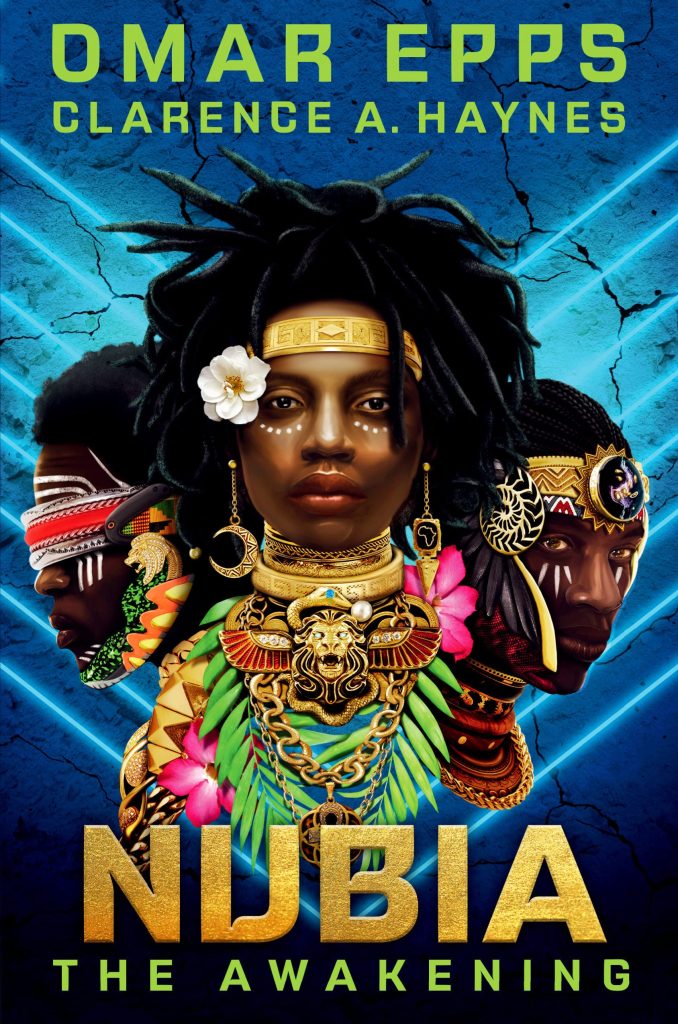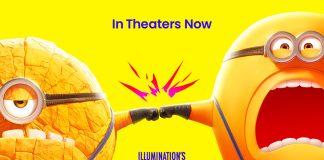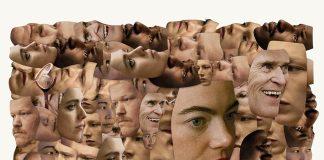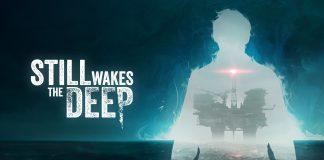From beloved actor and producer Omar Epps and writer Clarence A. Haynes comes the biggest epic fantasy of the year, Nubia: The Awakening. A powerful saga of three teens, the children of refugees from a fallen African utopia, who must navigate their newfound powers in a climate-ravaged New York City. Perfect for fans of Black Panther and Children of Blood and Bone.
Here’s the summary…
For Zuberi, Uzochi, and Lencho, Nubia is a mystery. Before they were born, a massive storm destroyed their ancestral homeland, forcing their families to flee across the ocean to New York City. Nubia, a utopic island nation off the coast of West Africa, was no more, and their parents’ sorrow was too deep for them to share much of their history beyond the folklore.
But New York, ravaged by climate change and class division, is far from a safe haven for refugees, and Nubians live as outcasts, struggling to survive in the constantly flooding lower half of Manhattan, while the rich thrive in the tech-driven sky city known as the Up High.
To many, being Nubian means you’re fated for a life plagued by difficulties and disrespect. But Zuberi, Uzochi, and Lencho are beginning to feel there might be more. Something within them is changing, giving each of them extraordinary powers. Extraordinary and terrifying powers that seem to be tied to the secrets their parents have kept from them.
And there are people Up High watching, eager to do anything they can to become even more powerful than they already are. Now Zuberi, Uzochi, and Lencho will be faced with the choice—do they use their inheritance to lift their people, or to leave them behind. The fate of their city, and their people, hangs in the balance.
High stakes!
Listen, anytime the fate of anything hangs in the balance you know it’s a big deal, and that’s what you can expect from Nubia: The Awakening, the first book in this new Afrofuturist series from the writing duo of Omar Epps and writer Clarence A. Haynes. I believe good writers find a way to inject some of their own truth into stories, crafting a tale that rings familiar to the world in which they exist, most writing spaces have a window to stare out of after all. As for Epps and Haynes, fantastical and magical properties aside, it seems the inspiration for Nubia could’ve come from watching the news, where we are treated to a never-ending litany of horrible events and a world on fire. And since its set in the future, the book has a portentous feel to it, an admonishing cautionary tale that is equal parts dire-warning and scathing rebuke. Either way there’s lots here to unpack so let’s get after it.
A handy prelude offers an abbreviated timeline of events leading up to future present day, allowing the authors to get this story off and running without too much reliance on backstory. And since its set in the not-so-distant future (2093), that’s a good thing, because we don’t always need to know how we got from A to B in laborious detail. And Nubia very much starts off in media res, zipping us through some character introductions, setting their world up only to just as quickly tear it down. It’s true; Nubia was one of the breeziest reads for me this year, not entirely surprising since it’s only 368 pages long.
One of the first things you’ll notice is that Nubia is character heavy. It’s got a good-sized cast and you meet most of them fairly early with mains Zuberi, Uzochi, and Lencho leading the way. Each comes with side characters of their own, making Nubia a family affair, literally and figuratively. Yes, family, and in turn community, plays a huge role in this story, one where the government offered assurances that will not be reached, resulting in a racial/cultural partition. Like the summary says, many of these Nubian teens are part of broken families, parents who carry the weight of the past, grieving for a life their children will never know. But as is the case with any diaspora, the promise land is only as good as the welcoming committee, so while New York may have seemed like a good idea (their only option) at the time, it’s been far from sybaritic. This is felt predominately on the streets as the privileged live in techno-luxury high above the Manhattan skyline, in a sky city that is conveniently and unendurably a visual reminder of a better life.
For those mostly white lucky sky-devils, that means luxury, that means access, and that means safety. For the Nubians down below, their day-to-day is more meager, generally speaking, with limited opportunity and a lack of hope that life can be better. The aforementioned three leads offer a dissimilar perspective on what life is like for a Nubian living in the “Swamp”, what they call the Nubian quarters. For Zuberi, she’s been trained for most of her life by her father, always prepared, always dutiful, always ready to defend herself. The scholarly Uzochi prefers reading, knowledge, hoping overachieving academically will one day land him a spot on an elevator ride to “Up High”. His quick-tempered cousin Lencho is the opposite, forgoing school for the streets, joining one of the local gangs, the Divine Suns, who peddle a popular drug called “Elevation”. These three are products of their home environments, all with proud Nubian parents who have suffered in the past, and like their offspring, some handle it well, some don’t.
The antagonist in the book is much more metaphysical than an actual person. A discernible understanding, that we have a relationship with everything and everyone around us, both the physical and the non-physical, that we are one. And if that balance is upended for nefarious reasons, it creates instability, and in response, rare abilities long thought dead and only whispered about, re-emerge. For palpability, the authors have put a face to it, Krazen St. John, who is the head honcho of the “Up High” and a major player both politically and militarily down on the ground. St. John delivers the seemingly-do-gooding-megalomaniacal-rich-guy-in-the-sky routine, occasionally descending from up high to spread good will and misinformation to the peasants below, who are split on his heavy-handed false-prophet bit. It’s a little on the nose but expect a lot of theistic symbolism as you make your way through Nubia. Thanks to an infinite number of examples, we tend not to trust these types of folks, and Krazen for his part, doesn’t seem terribly trustworthy at the start. He’s got that snake oil salesmen thing down pat and the book doesn’t really offer any hope that he’s a good dude, as he treats those around him, including his daughter Sandra, like useful idiots.
Speaking of Sandra, she’s got daddy issues to spare and despite his cold-handed approach, seems all too eager to gain his trust and admiration. Yes, she’s driven by ambition and could prove to be the fly in her father’s Machiavellian ointment, or at least, that’s what the early parts of the book suggest, that she’s perhaps made of better stuff. Either way, she’s a great character and lives in that morally gray area, suggesting early that this won’t be a binary situation between good and evil, it’s a little more complicated than that, as it should be. After all, things like “good” and “evil” are mind dependent concepts, human constructs that put people in one box or another, discounting the vast spectrum in which we all actually exist, and this leads to the system of magic employed in Nubia.
“We were people of the mind, wielders of energy, healers, even shapeshifters on occasion, abilities that manifested depending on the individual.”
Adisa Elenkwa, a Nubian elder and walking exposition delivery machine, offers up a mid-book info dump, where we learn all sorts of things about Nubian’s past and their affinity towards a kinetic system of ancestral magic. Problem is, this magic was wiped out along with their homeland, and hasn’t been seen since…until now.
This most current generation of Nubians are experiencing a catalyst, or what Adisa calls “awakenings”, where of-age kids are starting to display abilities such as precognition, empathic-ness, and shapeshifting. To the uninclined, these attributes could be considered magical superpowers, to the ill-intentioned, powerful weapons at their disposal, and to these kids, it’s just another thing to deal with on top of the trials and tribulations of adolescence. But like the summary says, once these awakenings start happening and the cat is out of the bag, it’s a bit of a pandora’s box and these ill-prepared children are thrust into adulthood overnight.
It stands in glaring contrast to the way we view adolescence around the world, and how what’s expected of teenagers differs from region to region. There’s no question, generally speaking, a teenager in today’s North America lives a life of heady unresolve, and even if they’re capable of much more, they’re probably not going to prove us wrong. That’s a strong theme throughout the book, not only are these kids rebelling against being thought of as less than, being Nubian, but low expectations as well, being kids. This manifests itself differently in the book depending on which adults happen to be in the room or get to them first. We know from so much of what’s happening today in the news, that kids are having more and more decisions made for them. Whether its politicians masquerading as health professionals, or just complete strangers five states over, everyone has an opinion on what kids should or should not be allowed to do, we’re talking body autonomy.
And if a kid finds themselves in a position of great personal change or growth, we know conclusively, a positive and loving support system pretty much guarantees success in life. It’s confusing times for young folks experiencing loss, confusion, and fear, and when you’re suddenly made to feel powerful for the first time, that freedom is so delicate, and often susceptible to bad actors. I mean, doesn’t every kid dream of having superpowers? This is a big part of what these kids in the book are experiencing and, on this point, I think Epps and Haynes do a pretty good job of exploring the spectrum, how different kids deal with this unexpected, and sometimes unwanted, attention differently.
Ancestral systems of magic aside, the impetus for much of what happens here is climate-based replacement, or “climate refugees”. Disaster displacement occurs when populations, living in climate “hotspots”, typically lack the resources to adapt to an increasingly hostile climate. This of course disproportionally affects the most vulnerable people who live in some of the most fragile and conflicted countries in the world. All told, climate displacement affects an average of more than 20 million people each year.[1]
In most cases, these large processions are forced to cross borders creating a refugee crisis, a human rights powder keg, as neighboring countries are forced to deal with this sudden influx of desperately needy people. This creates a forced proximity type of situation, and if you know your history, you know that that rarely ends well. Yes, Nubia may be a work of fiction, but this is happening and continues to happen in countries like Syria where human-induced climate change resulted in extreme drought, causing large-scale migration and displacement. This disaster displacement continues to be a major factor in the longevity of the Syrian conflict whose civilian death toll has surpassed 300,000.[2]
Climate change is of course a hyperobject, too big to see, but in this case, Epps/Haynes have chosen rising sea levels as the most immediate threat. Biblical connotations aside, this looming threat surrounds those not lucky enough to live in these sky cities, saved only bay a rather large and ready-to-burst sea wall surrounding Manhattan, a constant reminder that their lives are one small crack away from being literally underwater. And when the place that offers refuge, in this case New York, experiences some of the same climate challenges, an already fragile class system shows its true colors. This almost always takes the form of xenophobia and racism, something that plays a role here, ranging from micro-aggressive to overt. Even a throwaway line like “Despicable the way they choose to live.” screams discrimination when you know the context.
Violence, criminal networks, and drugs are natural bedfellows to these types of situations as desperate people tend to do desperate things, and not to thrive, but to survive. That’s a powerful drug in of itself, self-preservation, and if comes down to protecting those you care about, you can easily start making life decisions that go against who you really are. These folks don’t need condemnation, they need help, and in absence of that, they’ll reach out in the dark for anything that will ease the pain. This is where community outreach and tribalism become vital, because when you can’t rely on those in power, you have no choice but to help yourself, to push back, to remove the foot from your neck.
So, what’s the bottom line?
District 9, Elysium, and X-Men comparisons aside, Nubia manages to balance more than few themes well. The class struggles between the “have” and “have nots” is about as universal a theme as you can get, its real-world impact providing more than enough allegories and pathos to supply an infinite number of fictional accounts. The Time Machine by H.G. Wells is of course well known where the aristocratic Eloi have become ineffectually and empathetically degraded, and the more monstrous Morlocks, their mechanical servants, have become fearful and reactionary. It seems, on this side of the world anyways, imperialism will always find a way to survive, creating a cynical and downright evil hierarchy where marginalized folks, minus supernatural abilities, will always have to work a little harder than everyone else.
And there will always be those who use minorities for their own nefarious gains, as shields, as puppets, as tools, as targets. Afterall, is there a more direct pipeline to autocratic control than instilling a sense of fear and hate in an already divided population? It’s unavoidable, it’s science, amygdalae come alive when you experience fear and uncertainty, and they are more developed in some (conservatives) than others.[3] So tapping into fear and anxiety, making a certain percentage of the population afraid and telling them who are to blame for their fear, well, that’s their playbook.
So, in that sense, Nubia, while a fun fantasy to think about, a community rising out of the ashes (or slums) to take on their oppressors is a bit of downer, because in real life folks don’t have superpowers. They can’t fly or turn into stone; they can’t read people’s minds and bring them back from the brink of the astral plain. But it occurs to me that perhaps that’s not the point? Maybe the point is that you don’t need the power of the sun to push back against the darkness, maybe all you need is a little faith. And as this first book ends with things looking less than bleak, and our heroes having suffered losses, it will be their faith that endures. Yes, these kids are alright, and their moment, their time in the sun has arrived.
As James Baldwin once said, “There is never a time in the future in which we will work out our salvation. The challenge is in the moment, the time is always now.”
For more information and to order a copy of Nubia: The Awakening, click HERE!
Cover art by Yung Yemi!
[1] https://www.psychologytoday.com/ca/blog/the-human-beast/201104/conservatives-big-fear-brain-study-finds
[2] https://www.ohchr.org/en/press-releases/2022/06/un-human-rights-office-estimates-more-306000-civilians-were-killed-over-10
[3] https://www.unhcr.org/climate-change-and-disasters.html














